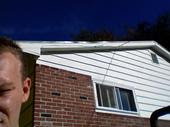
My friend Rich and I are both reading Robin Blaser's book of collected essays,
The Fire, and since we live in different cities, we started an internet book club called
The Fire on tumblr.com in order to talk about it. Anyone interested in those essays is welcome to join us around the virtual hearth. Email peachesandbats@gmail.com or vbstope@gmail.com and we'll "invite" you.
*
Check out
Delirous Hem for a bunch of people's thoughts about "Numbers Trouble" and sexism in poetryland.
*
It was an exciting weekend for poetry in Portland. On Friday, Lyn Hejinian, Joan Retallack, Marjorie Perloff, and Hank Lazer gave readings and a talk at PSU. I missed
that, but went Saturday to Lewis and Clark for "What's the Use of Poetry?: a Symposium," featuring the former three.
I came in late and caught the last half of a long talk by the famous critic, whose argument, under the rubric of "Unoriginal Genius," seemed to go something like: "Kenneth Goldsmith and Walter Benjamin have a lot in common, because they're both very fond of quotation."
Then Retallack gave a reading that opened with a short talk on "Procedural Elegy," which turned halfway through into a practical example of same, a long poem of mesmerizing recurrences which seemed to be based on some alphabetical procedure. I don't know Retallack's work at all, and I suspect it's the sort of thing that takes some patient investigation and getting used to on the page in order to really "hear" it. As it was, I didn't respond much to it—but then, I'm not the brightest bulb on the marquee when it comes to registering a text's complexities in a live listening, and this is certainly complexly patterned, tough work. One poem, "Existence Is an Attribute," proceeded (she explained) from Kant's claim, in refuting Anselm's ontological proof of the existence of God, that "existence is not an attribute." It consisted of several versions of a narrated conversation, each broken up (usually midsentence if not midphrase) into smaller numbered sections, so that a slowed-down counting was continually interrupting a slowed-down account of one person's insistence to another, on a muddy road in the country, that "I am proving you do not exist."
Then Hejinian came up and gave an utterly astonishing, delightful, funny, exhilarating reading. There were two 14 line elegiac poems, and a number of poems from her ongoing series of "night works" The Book of a Thousand Eyes, an "homage to Scheherezade" — fairytales, "insomniac lyrics," lullabies, tractates in dream logic, and of course dreams. Favorite sentences:
She'll never believe she's too old to play in a band or make quick, vertical moves in the playing field to really quiet music.
Activity never sleeps, and no tale of crumbling cliffs can be a short one.
"Sport," says the lecturer, "is dependent on the occasional appearance of wild animals."
Perhaps this "Taskinlife" was a poor soldier with holes in his boots, a bad back, and warped arrows.
I'd looked into
My Life and knew she was the real deal, but I didn't expect anything so full of immediate surprise, sharp perception, dead-on tonal shifts and parodies of traditional modes, and
critical laughter. Now I'll go read everything of hers I can find. (Eventually. I'm slow.)
There was a Q&A afterwards. Hejinian: "It's actually very difficult to write only non-sequiturs." Retallack: "You must be trying to write good ones."
*
And on Sunday I got my chance to see Lazer read with Laura Feldman at the NAAU (a
Spare Room joint). He interspersed readings from several books of poems with short passages from his new book of critical prose,
Lyric and Spirit. I've never seen such a straightforward demonstration of the interaction and even interdependence of the two modes in a life's practice. Both poems and prose thought about and
did music—with Coltrane, Monk and Cage as friendly presences—and responded by quotation and specific praise to the work of other poets—Creeley, Zukofsky, Ronald Johnson, Olson. At they same time they engaged with Jewish mysticism and numerology, southern cooking, videogames, and an attempt to reclaim the word
spirit from our floppy cultural habits, our hazy enthusiasm or easy squeamishness.
Laura Feldman gave a very surprising slideshow and reading about her two years in the Peace Corps in Uganda, a subversion of the conventionally informational "Peace Corps presentation" she was expected to give on her return. Excerpts from notebooks alternated with quotations from a bilingual phrasebook and from a book of poems,
Labyrinths, by the Nigerian poet
Christopher Okigbo.






